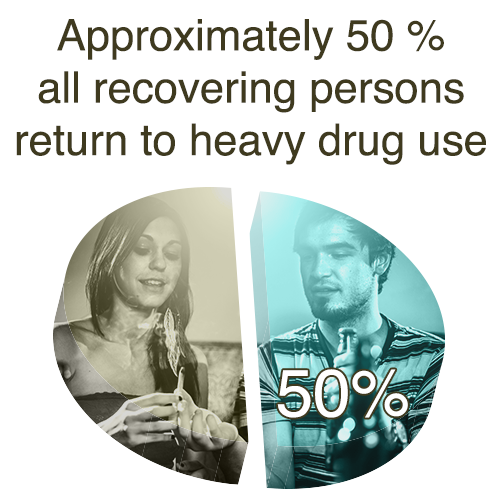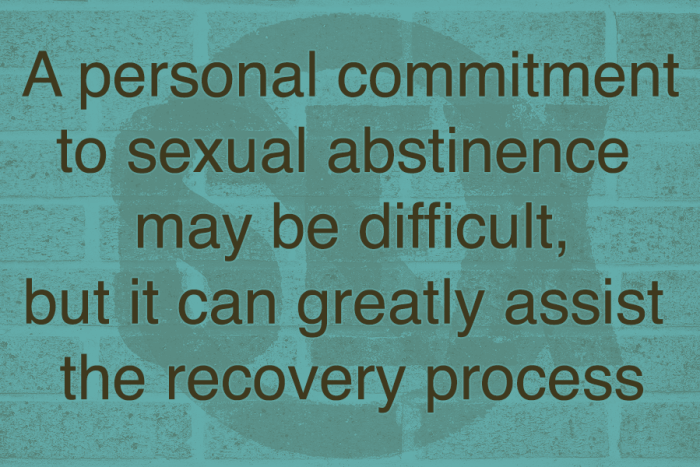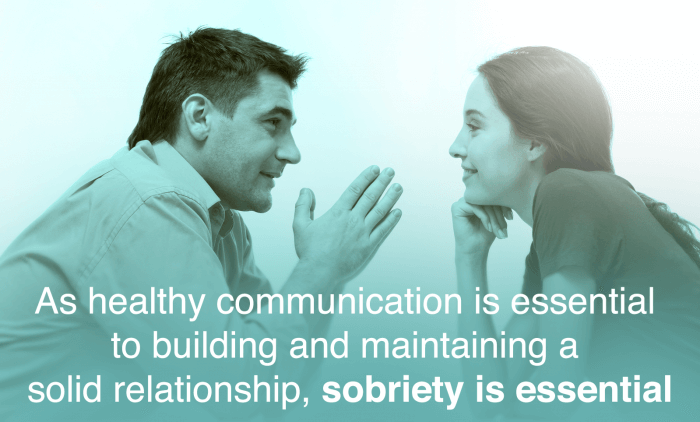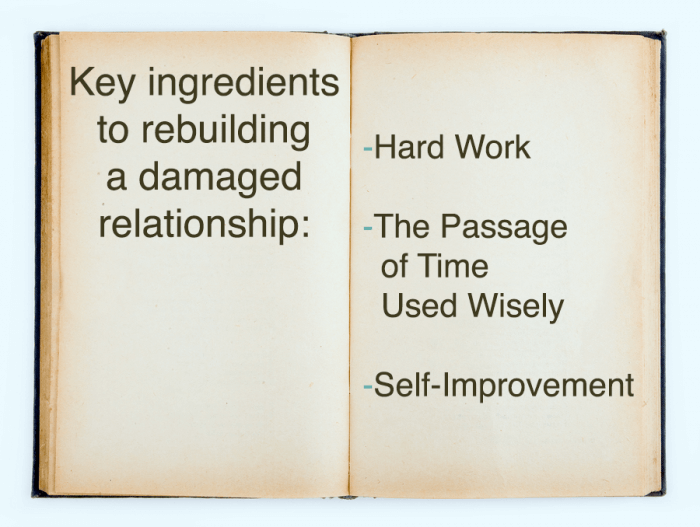
The term “recovery” covers different phases of the drug rehab process, from the first day of abstinence to decades of sobriety. For this reason, it can be difficult for a recovering person to gauge when it’s a healthy time to be in a romantic relationship. But there is one agreed-upon piece of guidance from addiction treatment professionals: the best practice is to abstain from entering into new relationships while in a drug rehab program.
According to the National Institute on Drug Abuse, the following types of treatment or services are involved in a structured treatment program:
- Individual and group psychotherapy
- Supportive services, such as housing help
- Support group meetings (such as NA)
- An aftercare program[1]

The early phases of treatment, such as detox and maintenance, are intensive and require considerable personal dedication. For this reason, addiction specialists agree that it is not a good idea to begin a “rehab romance” with someone in, or affiliated with, the treatment program. However, a recovering person may think that once he has detoxed, he is likely to maintain abstinence, and therefore, it is a safe time to enter a relationship or get intimately involved with another person. Research on relapse rates, however, does not support this idea.
According to Psychology Today, the first 90 days of drug recovery treatment present the greatest risk of relapse.[2] In fact, research studies show that approximately 50 percent of all recovering persons return to heavy drug use, and 70 to 90 percent return to mild to moderate use (but may regain sobriety).[3]
A recovering person may instinctively feel hostile toward advice to defer romantic relationships while in recovery. Having a romantic relationship is a core part of human existence. However, the issue of being in a relationship should not be framed in terms of a human right, but rather what the best practice is to ensure a healthy long-term recovery.
Starting a New Relationship in Rehab
According to The Fix, the search for romance is alive and well in many rehab programs, however inadvisable the practice.[4] One explanation for this tendency is that once drugs have been removed from the brain’s reward system, other pleasure-inducing experiences become desirable, including the high of sex and a new romance.

The pleasure-seeking drive can present a strong challenge to even the toughest safeguards a rehab programs implements to help recovering persons remain entirely focused on recovery. For example, if a rehab has a policy as restrictive as separating the sexes, most adults and even teenagers are able to get around this rule.[5] Further, separation of the sexes is based on a heteronormative assumption; for those persons who are homosexual or bisexual, same sex rehab does not offer an effective solution. A personal commitment to sexual abstinence may be difficult, but it can greatly assist the recovery process.
Rehab doors are usually closed to the public. However, the ABC special Family Secrets provides an inside look into the drug recovery process through the experience of actor Daniel Baldwin, a self-professed cocaine addict.[6] As of the time of filming the documentary special, Baldwin had been in rehab several times. While it appears from the documentary that Baldwin entered rehab single, he began dating while in recovery.
Baldwin did not have to go far to meet a love interest; shortly after starting his televised rehab, Baldwin began to flirt on camera with the rehab center chef, Joanne Smith, despite the rule prohibiting such conduct at his luxury rehab center. Baldwin’s affections were returned as Smith decided to leave her job at the rehab center and move in with Baldwin after his program ended.[7] The couple later married, had two children, and ultimately divorced.[8]

It should come as no surprise that the timing of Baldwin’s relationship is a sensational point in the ABC special. One obvious concern is that a drug abuser in therapy is advised to focus on himself and the recovery process rather than couple up in a new relationship. Dating someone in the rehab environment, be it a fellow recovering person or a staff member (certainly an anomaly) begs the question: Is the drug abuser simply substituting the pleasurable feelings of drugs with the pleasurable feelings of a new relationship? Is the new relationship a conscious or unconscious strategy to avoid the personal work rehab requires?
While the answers to these tough questions will depend on the recovering person’s specific circumstances and psychological state, prevailing wisdom remains, rehab relationships are not a good idea. This rule of thumb does not exclude the relationship from happening in the future. In fact, issues relevant to starting a new relationship down the road can be directly addressed in both one-on-one psychotherapy and in group therapy. Also, the communication and social skills learned during treatment and ongoing talk therapy post-rehab can help improve one’s relationships overall.
Married and in Rehab

The 1962 film, Days of Wine and Roses, starring Jack Lemmon as Joe Clay and Lee Remick as Kirsten Arnesen – both actors were nominated for Oscars – squarely looked at a married couple in the grips of addiction. Spoiler alert: As Joe gained sobriety through the help of Alcoholics Anonymous, his relationship with Kirsten became increasingly strained. In the end, Kirsten leaves behind a sober Joe and their daughter, because she does not want to recover. The movie dramatically highlights the divide between a sober and non-sober spouse, and all the tensions involved.
However welcomed it is for a spouse to enter rehab, the other spouse may face feelings of abandonment, loss, and confusion. As therapist and co-dependency expert Darlene Lancer discusses how when one partner has substance abuse issues the other partner may have codependency issues.[9] Codependency, which may itself be considered a disorder, occurs when one person becomes so dedicated to the needs of another person (such as a substance abuser) that his or her identity largely becomes tied into the caregiving and rescuing role in that relationship. This psychological dynamic then has the unintended consequence of enabling the person in need, such as a substance abuser, to continue to be dependent on the caregiver. This relationship dynamic can therefore unwittingly keep the substance abuser using and the caregiver rescuing, which is an unhealthy place to be for both parties.
Entering rehab is an opportunity to break an unhealthy cycle of drug abuse and codependency. Additional good news is that many drug treatment programs will incorporate the spouse or loved one into the therapy, such as in family therapy sessions. In fact, research studies show that incorporating a partner or spouse into treatment is very important to the recovery process.[10] But it is also important to keep in mind that even if a spouse attains sobriety, marital problems may still persist.
Although a spouse’s or partner’s substance abuse may be a significant factor in relationship conflicts, it is likely not the only issue. Couples may be surprised that healing the addiction does not fully heal the relationship. The important takeaway is that recovery is a crucial step, but it is only the starting point of healing the relationship. Healing the couple not only helps the relationship but can also be instrumental to helping the recovering person maintain sobriety.[11]

As rehab is often not a public process, the celebrity experience of recovery, because of its media coverage, can provide rare glimpses into the fears and realities around entering treatment. For instance, in October 2006, country start Keith Urban had only been married to movie star Nicole Kidman for four months when he checked into rehab for the third time. In an interview with Oprah, Urban confessed that he feared going to rehab would destroy his new marriage.[12] In fact, Urban considered delaying rehab for alcohol and drug addiction until his relationship with Kidman had a few years to get more solid. Urban’s initial thought not to enter rehab may not have been wise, but it was understandable. Today, Urban and Kidman remain married, and Urban has reportedly not suffered a relapse nor returned to rehab since his 2006 stay.[13]
The Internet is replete with mixed personal accounts of how rehab impacted a marriage or other intimate relationship. The Urban-Kidman anecdote illuminates that the fear of losing a relationship should never keep a person from entering rehab. In fact, as discussed earlier, going to rehab will likely improve a relationship.
As healthy communication is essential to building and maintaining a solid relationship, sobriety is essential. Rehab can level an unhealthy relationship to its bedrock and give the couple a new and improved chance to rebuild.
Co-Addicted Couples
Research has found that drug users have a preference to romantically partner with other drug users over non-users.[14] Further, a relationship satisfaction survey found that persons who abuse drugs feel happier with a partner who also uses compared to a sober partner.[15] The bond between co-addicted couples presents numerous challenges to getting each person into treatment or into a couple’s addiction treatment program (where available). Some of these challenges include:
-
Substance user’s priorities
Preserving the relationship and status quo may be more important than getting sober.
-
Emotional weight
Stopping drugs can trigger uncomfortable feelings of disloyalty and relationship instability, which can in turn fuel further drug abuse.
-
Financial dependence
A fear that getting sober could result in withdrawal of housing and other means of survival that the substance-abusing partner provides or controls.
-
Child custody issues
There may be a concern that if child protection authorities learn both parents use drugs, the children will be removed from the home.
-
Threats to physical safety
A desire to get clean could trigger a violent reaction in a partner who does not want to quit.[16]
In view of the barriers to treatment for co-addicted couples, the National Abandoned Infants Assistance Resource Center (NAIARC) at the University of California, Berkeley advises that specialized services be provided to couples at the very inception of treatment. As NAIARC notes, a recovering substance abuser faces a considerable risk of relapse if, after treatment ends, he or she resumes a romantic relationship with a substance-abusing partner. Further, once successfully detoxed, the resumption of drug abuse can carry a dangerous risk of overdose.[17] NAIARC makes clear, in its expert position, that treatment of one person in a co-addicted couple is winning only half the battle, and even that gain may be short-lived in view of the risk of relapse.
Co-addicted couple rehab is an emerging treatment option. While some centers may admit couples, few have likely developed and implemented programs specifically tailored to this situation. For instance, an addiction psychotherapist may be qualified to work one-on-one with an individual or even run a group but not have specialized training in couples therapy. Some addiction specialists may advise the couple to seek treatment in separate facilities, so as not to compromise the integrity of each partner’s individual work in rehab. But as research in this niche area develops, co-addicted couple rehab may blossom into a staple offering across recovery programs nationally.

Relationship Status After Rehab
Psychological addiction to drugs manifests in ways that can ruin a relationship, including physical and/or verbal abuse, lying, cheating, stealing, and financial collapse.[18] But according to addiction professional Russell Goodwin, it is possible to repair a damaged relationship after rehab. The key ingredients are no surprise: hard work, the passage of time used wisely, and self-improvement.
After rehab, participation in different aftercare programs, such as Narcotics Anonymous (NA), can help to rebuild romantic relationships. For instance, Narcotics Anonymous program members follow the 12-step model, which includes a step of making amends as part of the ongoing recovery process.[19] This step involves taking stock of the people whom the addiction hurt and making efforts to heal those relationships. For many, a spouse or other intimate partner will be at the top or near the top of that list.

NA may not spell out how to make amends – that would be difficult because it’s a highly personal process – but participation in group meetings can help to empower and guide the recovering person to take the healthiest steps toward rebuilding damaged relationships. It is also advisable to address relationship repair issues and concerns in one-on-one counseling, which is also a recommended part of an effective aftercare program.
There is also the possibility that after rehab the recovering person or his or her partner will decide to end the marriage or relationship. At this point sobriety has been achieved, which provides ideal groundwork for making an informed decision about the course of the relationship. Couples work is not the province of an addiction counselor; a recovering person is advised to discuss any concerns about the potential breakup in individual psychotherapy, especially when relationship stress may trigger a relapse. The recovering person’s addiction counselor/psychotherapist may be seen as a professional member of his or her support network but is usually not the go-to person for couples work.

Couples most often seek help from a marriage counselor when divorce or a breakup is on the table.[20] But there is no reason couples have to wait to the near breaking point to seek professional help. Recovering individuals who had no history of meeting with a therapist before rehab will now be well acquainted with this service. For this reason, a recovering person may be more willing than ever before to meet with a marriage or couples counselor. Such meetings can also steady emotions and reduce stress to help avoid the possibility of a relapse.
According to the National Institute on Drug Abuse, there is a 40-60 percent drug relapse rate.[21] The prevalence of relapse may seem alarming, but it is important to understand that relapse is not completely determined by personal choices. Recent research at Brown University sheds light on how stress triggers certain regions of the brain and can lead to a drug relapse. One of the study’s main conclusions is that it may be possible to introduce a drug that could prevent stress from activating the kappa opioid receptors (KORs), a neurological site that plays a role in drug relapse.[22] The future, therefore, may hold out improved anti-relapse treatment options that combine both KORs blocking medication and aftercare services like talk therapy.
Citations
[1] “Principles of Drug Addiction Treatment: A Research-Based Guide (Third Edition).” (Dec. 2012). National Institute on Drug Abuse. Accessed June 10, 2015.
[2] Sack, D. (Oct. 19, 2012). “Why Relapse Isn’t a Sign of Failure.” Psychology Today. Accessed June 10, 2015.
[3] Ibid.
[4] Somoza, L. (April 21, 2011). “The Truth About Rehab Romance.” The Fix. Accessed June 10, 2015.
[5] Ibid.
[6] “Primetime: Family Secrets.” (July 17, 2007). ABC Inc. Accessed June 10, 2015.
[7] Ibid.
[8] Dodge, S. (Nov. 24, 2014). “Fourth time’s a Charm! Daniel Baldwin Announces Engagement to Robin Sue Hertz Hempel.” Daily Mail (UK). Accessed June 10, 2015.
[9] Lancer, D. (n.d.). “Symptoms of Codependency.” PsychCentral. Accessed June 11, 2015.
[10] Fals-Stewart, W. (n.d.). “Substance Abuse and Intimate Relationships - AAMFT Therapy Topic.” American Association for Marriage and Family Therapy. Accessed June 11, 2015.
[11] Ibid.
[12] “‘I Thought it Would Tear Us Apart:’ Keith Urban Feared Rehab Would Destroy Marriage to Nicole Kidman.” (Nov. 30, 2010). Daily Mail (UK). Accessed June 11, 2015.
[13] Ibid.
[14] “Social Work Intervention with Addicted Couples.” (Feb. 2013). AIA National Resource Center. Accessed June 11, 2015.
[15] Ibid.
[16] Ibid.
[17] Sack, D. (July 22, 2013). “When Relapse Turns Deadly: What You Need to Know About Drug Overdose.” The Huffington Post. Accessed June 11, 2015.
[18] Rothman, J. (April 20, 2009). “Repairing Relationships After Addiction.” Everyday Health. Accessed June 11, 2015.
[19] Ibid.
[20] Mapes, D. (May 3, 2012). “Should We Call it Quits? A New Kind of Couples Counseling.” Today Health. Accessed June 11, 2015.
[21] “Relapse Rates for Drug Addiction are Similar to Those of Other Well-Characterized Chronic Illnesses.” (July 2008). National Institute on Drug Abuse. Accessed June 11, 2015.
[22] Gregoire, C. (March 11, 2013). “Stress & Addiction: Research Identifies How Stress Triggers Drug Relapse.” The Huffington Post. Accessed June 11, 2015.


